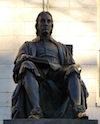News
Happy Pi Day to you! Happy Pi Day to you! Happy 3.14159265358979323846264338327950288.... Day to you! Happy Pi Day to you!!
Today is International Women's Day! Plus is run entirely by women who are happily disregarding maths and gender stereotypes, so we're very pleased to join in the celebrations. We've got lots of content by or about women mathematicians on Plus and here are some of our favourites. (And we'd like to ask all remaining dinosaurs to stop sending us emails starting "Dear Sirs"...)
If you've been worrying about how to combine the imminent Olympic fever with that other great passion — maths — then salvation is about to arrive. John D Barrow, eminent cosmologist, best selling author and director of the Millennium Mathematics Project (of which Plus is a part), has written a book, 100 essential things you didn't know you didn't know about sport, exploring the maths behind your favourite disciplines. And if you're near London or Cambridge you can see Barrow himself talk about some of its contents — for free!
Interested in the connections between art and science? Then come to this free public lecture at the Isaac Newton Institute in Cambridge on March 14, 2012 to hear theoretical physicist David Berman and artist Grenville Davey talk about string theory as an inspiration to art.
Struggling with that new year's resolution to lose a few pounds? Weight not dropping off as fast as you'd expected? A new mathematical model has some good news and some bad news for you. Which would you like to hear first?
How many people died? It's one of the first questions asked in a war or violent conflict, but it's one of the hardest to answer. In the chaos of war many deaths go unrecorded and all sides have an interest in distorting the figures. The best we can do is come up with estimates, but the trouble is that different statistical methods for doing this can produce vastly different results . So how do we know how different methods compare?
From jelly fish, to biomass, to topology and speeding neutrinos, we've had a busy first two days at the AAAS meeting in Vancouver.
Yesterday's refusal by the UK government to posthumously pardon Alan Turing makes sad news for maths, computer science and the fight against discrimination. But even if symbolic gestures are, symbolically, being rebuffed, at least Turing's most important legacy — the scientific one — is going stronger than ever. An example is this week's announcement that scientists have devised a biological computer, based on an idea first described by Turing in the 1930s.
Another postcard from Plus' temporary Cambridge/Boston office!
